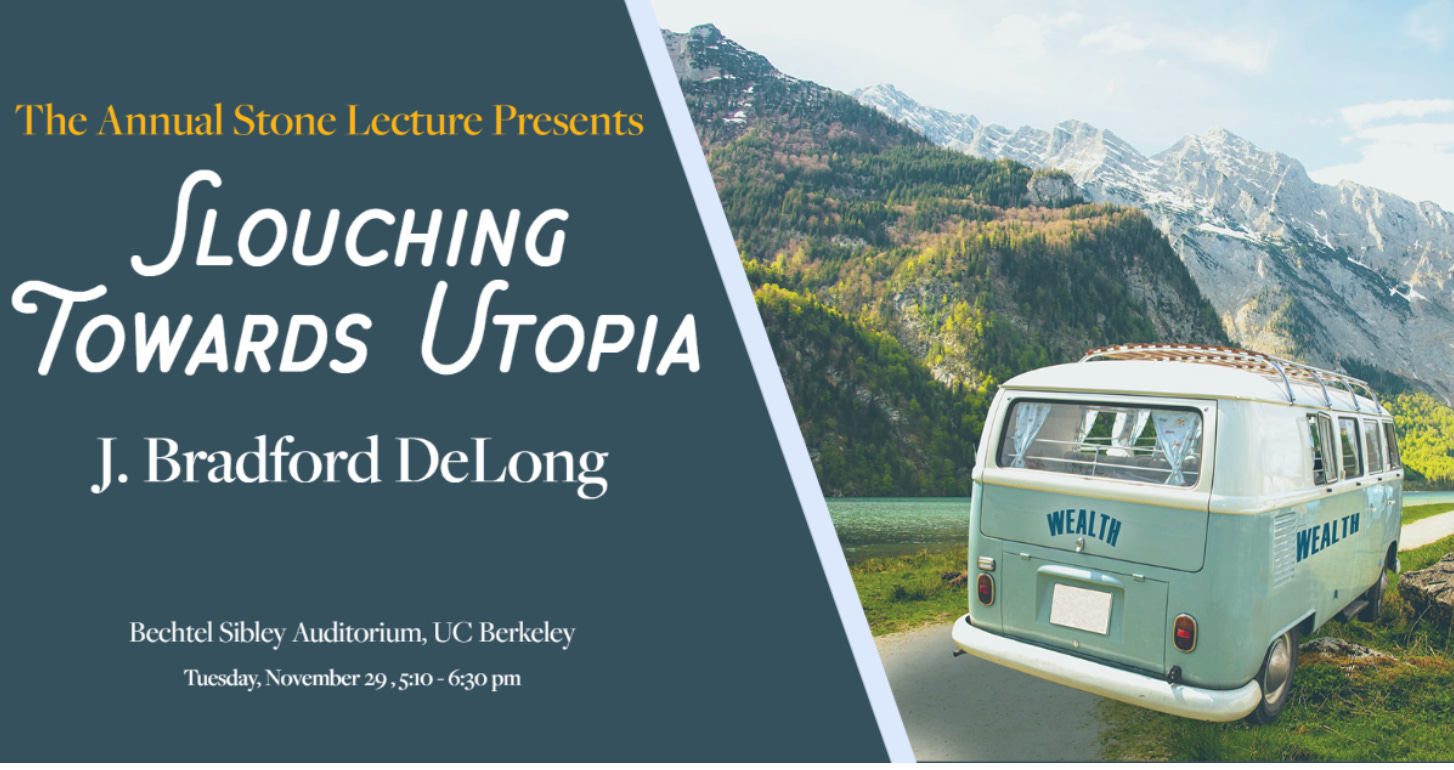A Positive Narrative for a Global Future, &
BRIEFLY NOTED: For 2022-11-05 Sa
FIRST: A Positive Narrative for a Global Future:
From my Ezra Klein Show taping:
Ezra Klein: We talked earlier about the info-biotech possibilities. You talked about domination and communication. What do you think the moral, economic narrative is that would work in this era? What do you think, when people begin trying to tell a story, they need to be paying attention to, recognizing that it’s more than an economic policy?
Brad DeLong: Paul Seabright’s book: The Company of Strangers. You drop any one of us in the wilderness and we die…. We … have to be part of a society with a sophisticated division of labor…. We have… a… propensity to engage in gift-exchange relationships…. You don’t want to be a moocher, but you also don’t want to always be the person doing the work…. This complicated dance of favors and obligations in which, ideally, everyone feels obligated… even though everyone is getting enormous amounts from the relationship. And we invent coins. And, all of a sudden, you can have this gift-exchange relationship not just with your neighbors, your friends, and your kin, but… with everyone everywhere….
[We need] to realize how very lucky we are and how we all are cousins and how we all are involved in this reciprocal exchange of favors for each other…. [We need] to take that very seriously.
Adam Smith, in The Wealth of Nations, has a passage where he’s arguing against mercantilists who say a low-wage economy is going to be a strong economy because… your gold… [buys] lots of work on … and project[s lots of] military power…. He says: wait a minute. The society is made up of people. If most of the people are starving, is that a good society? And then he does this gift-exchange, intellectual judo move, saying: “it is but equity, besides, that those who feed, clothe, and care for the rest of society should themselves, be well fed, well clothed, and well cared for.”…
To take seriously that the market economy is a gift-exchange network… [among] cousins…. We have enormous amounts in common [with] and we owe [many] things to people far away. There are people in Pakistan who wove the carpets that are on the floor of my living room…. Every time I walk on them, I should think:… “I have this wonderful carpet…. And when the dog barfs on it we go to considerable effort to clean it off because it is a thing of beauty…. I… have an obligation to…the guy in Pakistan… who tied these knots.”… Whatever I should do, I should take care that he is somewhere close to the front of my mind.
CONDITION: Is This the Effect of the Ezra Klein Show?
A nice day-of-release-of-the-podcast bump in the Amazon sales ranking:
Very hard to tell…
My guess from a number of sources and comparisons is that the book is closing in on 20,000 worldwide all-formats copies sold now, but there are annoying lags and gaps in reporting.
One Audio: DeLong on Stephanomics:
Then Stephanie speaks to University of California, Berkeley economist Bradford DeLong about his new book, Slouching Towards Utopia. DeLong argues that the 20th century essentially started in 1870, a technological turning point after which production was rapid enough that (at least theoretically) we could bake a large enough economic pie to provide for all. The fact that, in the real world, everyone doesn't have enough is a symptom of our failure to distribute goods and services equitably, DeLong observes. Getting in the way of that goal as well are human foibles including a desire to distribute wealth to their children and a related disdain for inheritance taxes, as well as abhorrence of people who appear to be getting a free ride, he says…
<https://overcast.fm/+x7cvIR2_M>
One Image: This Year’s Stone Lecture:
Let me jump the announcement and say that I am going to be giving the Stone Lecture this year.
Must-Read: Song Dynasty China:
Doug Jones: A Cycle of Cathay: ‘“The innovations which make their appearance in East Asia round about the year 1000 … form such a coherent and extensive whole that we have to yield to the evidence: at this period, the Chinese world experienced a real transformation. … The analogies [with the European Renaissance] are numerous – the return to the classical tradition, the diffusion of knowledge, the upsurge of science and technology (printing, explosives, advance in seafaring techniques, the clock with escapement …), a new philosophy, and a new view of the world. … There is not a single sector of political, social or economic life in the eleventh to thirteenth centuries which does not show evidence of radical changes in comparison with earlier ages. It is not simply a matter of a change of scale (increase in population, general expansion of production, development of internal and external trade) but of a change of character. Political habits, society, the relations between town and country, and economic patterns are quite different from what they had been. … A new world had been born…”—Jacques Gernet. A History of Chinese Civilization, pp. 298-300….
The changes are dramatic. Population roughly doubles, from about 50 million to about 100 million…. The division of labor advances… “goods such as rice, wheat, lighting oil, candles, dyes, oranges, litchi nuts, vegetables, sugar and sugarcane, lumber, cattle, fish, sheep, paper, lacquer, textiles and iron.” In a number of fields of technology – iron production, shipbuilding – China reaches heights which the West will not attain for many centuries…. Taxes come to be mostly collected in cash…. Eventually revenues from taxes on commerce, including excise taxes and state monopolies, will greatly exceed those from land tax. A Council of State will put constitutional checks on the power of the emperor. Yet…. The nomad brake…. Rice economics…. Rice psychology…. The history of the Song period poses in particularly clear form the “Needham puzzle” of why the Industrial Revolution did not originate in China. The answer, it seems, is complicated, combining (at least) political and social responses to external threat, the nature of agricultural economies, and more intangible (but still measurable) differences in cognitive style…
Oþer Things Þt Went Whizzing by…
Very Briefly Noted:
Django Wexler: ‘10/10 macroeconomic hubris simulator, would recommend: So my Victoria 3 playthrough has taken an interesting turn.I'm playing as Chile, and basically just trying to industrialize rather than take over the world. So I've got my three little states and I'm content…
Louis Ashworth: Support group for confused BoE watchers: ‘Taking the journey towards understanding, together: Yesterday’s Bank of England day started with a historic rate hike, and ended with Governor Andrew Bailey confirming he would never try to overthrow a Prime Minister. If it all seemed like a bit too much, worry not: economics professionals are also very confused…
Abdul El-Sayed: Obama’s Attack Works Because He Hits Republicans Where They Think They’re Strong: ‘Not,,, the halting professorial cadence that came to characterize the Obama we knew as president. It was more “truth from the pulpit” than “talking points from the lectern.”… He demonstrated how Democrats can send a withering message about the economy without apology…
Maria Farrell: Twitter consequences; not just for little people: ‘There are now tens of thousands of journalists, policymakers, academics and various other thought-leader types who viscerally get what it is to be trapped inside a monopolistic tech platform, and for it to be costly and painful to leave...
¶s:
Conrad Swanson: Colorado River conditions are worsening quicker than expected. Feds prepare to step in: ‘Without enough snow this winter, the water level at Lake Powell — the country’s second-largest reservoir — will drop below a critical level by next November, according to a new report from the U.S. Bureau of Reclamation. Below that point, the Glen Canyon Dam will no longer be able to generate electricity and experts worry whether conditions will worsen to the point that the structure will no longer be able to send water downstream at all. Drought, overconsumption, and climate change, are main factors dissipating the amount of Colorado River water that will reach the Sea of Cortez on its journey through the Colorado River Delta…
Josh Marshall: ‘Let's say a few words about "brand safety”. Musk and top Republican leaders are now complaining that the problem is "woke" activists breaking Twitter and pushing it toward financial collapse. Nope. That's not it. Not remotely…. Advertisers want you to see their ads in a good moment, in a comfortable setting. Here's an example…. Even in his heyday Drudge never had better than low rent, crap ads…. Even though it was a hugely hugely popular site premium advertisers just don't want to be near something so hot and contentious. Half the people are hate reading anyway. There's always a big inverse premium for uck and discomfort and controversy…. The exceptions are venues that have something that can't be matched…. Musk basically bought Twitter on a lark. He was riding so high he thought he could basically buy Twitter with F—- Y— money. Since then he's been operating on the premise that he could both be Mr Free Speech (tm) memelord and make Twitter operate at a profit. It's one or the other. No advertiser wants to be near this drama or controversy let alone the next N-word explosion...
John Ganz: The Last Days of Twitter: I have to admit I was maybe a little bit wrong about Elon Musk’s Twitter takeover. I was under the impression that he had essentially adopted the reactionary tech ideology of his old business partner Peter Thiel and venture capitalist David Sacks, who is apparently part of his “war room” at Twitter. I thought he would essentially use the platform to wage a class war against unionizing workers and the “Woke” middle-strata of the professional-managerial class. Now I just think he really has no idea what he’s doing at all…
Dave Karpf: Elon's Twitter-Tilt: ‘It seems to me that, when Musk made that offer, his plan was pretty straightforward. Twitter was widely regarded as a poorly-managed company. It was far more influential than profitable. Musk figured he could buy the company outright, spend a year or two adding new monetization features and fixing the most glaring inefficiencies, then take it public again and turn a nice profit. He’d be declared a hero… adding another layer to the legend of Elon Musk…. I doubted at the time that it would actually work. But it’s a plausible story…. But then the tech crash happened…. Instead of buying a company worth $40-45 billion for $44 billion and then trying to flip it, Elon found himself buying a company worth $15-20 billion for $44 billion. So he tried to scrap the deal. But it turns out he can’t bully the Delaware Chancery Court the way he’s used to bullying the SEC. The deal went through. Elon massively overpaid…. The best-case scenario for an Elon-run Twitter would be one where he realized that his only hope for turning a profit lies in waiting out the tech crash. That requires patience and deliberate behavior. What we’ve seen in his first week is a gambler obsessed with his losses, taking wild swings trying to earn his money back. It’s an approach that is going to cost him. And it might take down Twitter before an approximate replacement has emerged…










If free speech comes with advertisements, then it isn't free.
A more parsimonious explanation is that Musk, who was always an antisocial jerk and liar, has been infected by the Q-MAGA virus and really believes that there are evil librul forces controlling an otherwise free people's ability to see true information and read/watch/consume/absorb it, and that is plan was to break that control and provide a free flood of information leading to Step 3) Libertarian paradise!!!